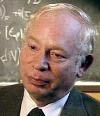|
In a now-famous statement, at the end of his book "The
First Three Minutes", the Nobel Prize-winning theoretical physicist Steven
Weinberg wrote that "the more the universe seems comprehensible, the more
it also seems pointless." In effect Weinberg was claiming that science
paints a picture of our universe as a vast purposeless place in which we can see
no evidence of a point for ourselves as human beings. Weinberg's statement was
perhaps one of the coldest ever issued by a scientist, and not surprisingly it
annoyed many religious believers. For Christians, and also for those of many
other faiths, the universe is inherently purposeful and humanity's role is
central.
 Needless
to say, religious believers have risen to the challenge. One Christian who
disputes Weinberg's view is Charles Birch, an Australian biologist who is one of
the founders of the modern science of ecology. Birch suggests that it is
probably not surprising that Weinberg, as a physicist, should come to such a
cold hard view of the universe, because he says physicists are "used to
looking at the world in a very mechanist way". But where Weinberg sees a
pointless world, Birch reads the evidence in a very different way. In
particular, where Weinberg sees the universe from an impersonal perspective,
Birch sees himself as an inherent part of the universal system that science
describes. Looking at the universe from this personal perspective, he says,
"I find meaning in it." Needless
to say, religious believers have risen to the challenge. One Christian who
disputes Weinberg's view is Charles Birch, an Australian biologist who is one of
the founders of the modern science of ecology. Birch suggests that it is
probably not surprising that Weinberg, as a physicist, should come to such a
cold hard view of the universe, because he says physicists are "used to
looking at the world in a very mechanist way". But where Weinberg sees a
pointless world, Birch reads the evidence in a very different way. In
particular, where Weinberg sees the universe from an impersonal perspective,
Birch sees himself as an inherent part of the universal system that science
describes. Looking at the universe from this personal perspective, he says,
"I find meaning in it."
Likewise, Father George Coyne - a Jesuit priest and astronomer
who has spent his life studying the formation of stars - insists that the
universe is full of meaning and purposefulness. He points out that for all
science's great achievements it is not necessarily the field which can show us
the point of either our own lives or of the universe as a whole. That task is
outside science, he says; instead it is to be found in our own experience as
human beings living in the world. As he explains: "The whole of human
experience, I think, tells us that there is a point, that there is
meangingfulness to things. When I hold the hand of a dying friend, and see the
expression of hope and joy - even at the moment of death - in that friend's
eyes, I can see that there is a meaningfulness to existence that goes beyond
scientific investigation."
 Interestingly,
Weinberg is much in agreement with Father Coyne. Although he believes that
science paints a picture of a "chilling, cold" and pointless universe,
he also insists that we human beings can give the universe a purpose through the
way we live our lives - "by loving each other by discovering things about
nature, by creating works or art." We may not be the stars in any great
cosmic drama, Weinberg says, but "faced with an unloving and impersonal
universe" we can nonetheless create for ourselves " a little island of
warmth and love and science and art." It is a deeply humane statement from
a man often associated with a cold, impersonal vision. What is most surprising,
perhaps, is that here an avowedly atheistic scientist expresses a view not
dissimilar to that of some religious believers. Interestingly,
Weinberg is much in agreement with Father Coyne. Although he believes that
science paints a picture of a "chilling, cold" and pointless universe,
he also insists that we human beings can give the universe a purpose through the
way we live our lives - "by loving each other by discovering things about
nature, by creating works or art." We may not be the stars in any great
cosmic drama, Weinberg says, but "faced with an unloving and impersonal
universe" we can nonetheless create for ourselves " a little island of
warmth and love and science and art." It is a deeply humane statement from
a man often associated with a cold, impersonal vision. What is most surprising,
perhaps, is that here an avowedly atheistic scientist expresses a view not
dissimilar to that of some religious believers.
Email
link | Feedback
| Contributed by: Margaret Wertheim
|


